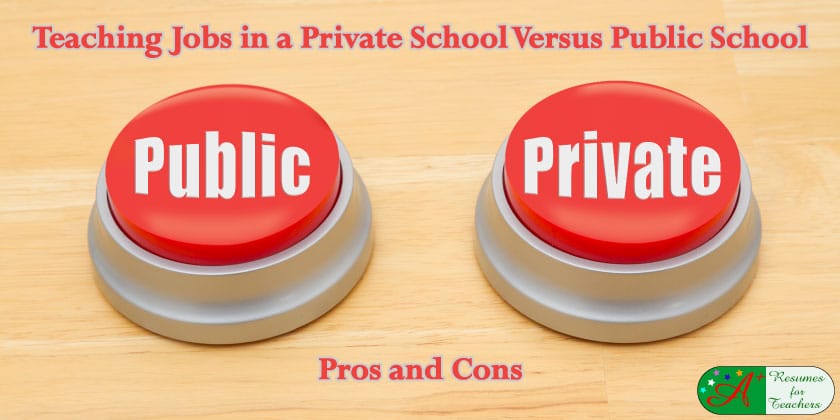Teaching jobs in private schools versus public schools vary. Let’s discuss the pros and cons and the differences.
There will be a few different teacher job interview questions depending on what school you have applied to for your job search.
Once you’ve received your teaching degree, the next step is deciding where to teach. This includes the school’s location and the classes you want to teach.
Once you’ve decided, one major question remains: should you teach in a private or public school?
There are differences between the public and private schooling systems, each with pros and cons. Understanding these differences will help you make that final decision.
Differences Between Private School Versus Public School
There are five main differences between public and private schooling: professional education levels, class size and control, student base, educational curriculum, and teacher pay. Based on your goals as a teacher, these variations may determine your motivation and how you choose to employ your skills.
There are benefits of working in an independent learning facility you may not be aware of, but things could pose a concern.
Professional Education Level
Government-run schools usually have standards and requirements on the educator’s education level that have to be met, including certifications and degrees. Private schools, on the other hand, have more flexibility when it comes to teacher education requirements.
Class Size and Control
Most private schools can regulate the number of students in one class. In fact, they use class size as one of their biggest marketing points to parents. In public schools, however, class size regulation is not possible because of the lack of adequate funding.
Another aspect to consider is the amount of control you, as a teacher, will have on your students. It is a well-known fact that most private schools have good disciplinary records.
This is because the school keeps the parents involved in their children’s academic lives. Private schools’ administrations reserve the right to remove or discontinue disruptive students from class. In public schools, however, the right of admission is not reserved. It takes a severe breach of conduct to get a student kicked out.
Student Body
Public schools are mandated to admit any students who seek entrance. Because they receive government funding, they do not have the right to select the students they would like to admit. Private schools, on the other hand, are based on the right of selection.
Most have particular requirements that they expect their students to meet. These requirements are often financial or academic, though various private institutions have full and partial scholarships for academically brilliant students.
Due to these conditions, most private schools do not have as diverse a student base as their public school counterparts.
School Curriculum
Public schools are not allowed to choose their own curriculum because they are government-funded. Furthermore, public schools must teach what is outlined in a government set of standards and requirements.
Additionally, public schools are required to complete standardized state-mandated tests. In private schools, the school’s board can choose and regulate its curriculum content, and it can opt to use the state’s standardized tests or create its own.
Teacher Salary
While most of these differences favor the private schooling system in terms of pay, the opposite applies in most positions. Teachers in public schools make at least $10,000 more than their private school counterparts. In private schools, pay is based on the number of students enrolled and the lack of union representation.
Please comment on your thoughts about private or public school teaching. I would love to hear from you.


